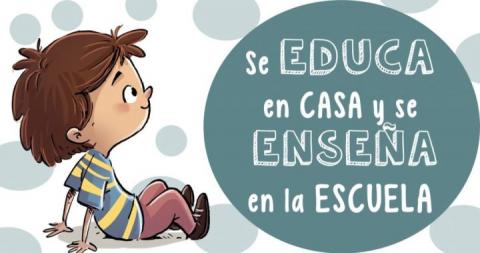
Educating and teaching have always been presented as two distinct tasks between home and school. However, more and more people are asking to what extent the institution of the school is involved in both. At the same time, some question whether parents should be empowered to help their children's education at home. The debate is on, let's get started!
Rumors that today's children and teenagers are more rude than ever are the order of the day, in fact, there are typifications for such cases! Have you ever heard of the Emperor Syndrome? In this article you will find more information. It seems that many families do not fulfill their role of educating and transfer these responsibilities to the school, claiming that it is the place where their children spend more time.
On the other hand, some parents defend how the work of teachers becomes intrusive at times, arguing that they should not impose their values on their children. Here is another article about it, so where does that leave us?
Why should home and school be understood as separate entities?
There is a generalized idea that education takes place at home and learning takes place at school. However, according to recent studies in which children and adolescents were interviewed, they feel more motivated if the teacher not only teaches the subject but also has a good relationship with them, cordiality and closeness. In these cases, it seems impossible not to give some kind of lesson about life or advice on maturity, doesn't it? That is to say, a task that goes beyond just teaching to memorize concepts.
For better or for worse, parents are not the only ones who will have an impact on the formation of their children's personality: the media also educate, television, the videos they watch on the computer to entertain themselves, the friends of the friends they will meet... Undoubtedly, parents will be a role model, but throughout their lives there will be many other variables at play.
If we want well-educated children, we must be self-critical and assume our responsibility as educators from the time they are small. Just as we must respect the way teachers act, whether we want to accept it or not, they will also do their bit in the education (not only didactic!) of our children. Seeing that this is a collective responsibility, we must trust them and, above all, communicate as effectively as possible so that the result is positive for everyone.
Education, therefore, is a very long process that begins with the family and is reinforced by the school. Thus, both parties are needed to achieve the full educational and personal development of the child.
A change in the educational model
No one is spared here: there have been changes both in the way families are educated and in the educational models of schools. In fact, if we focus on the second case, the beginning of the 20th century was the turning point for these models: new patterns of relations between families and schools, which were previously totally distant. Parents had no say in the school, but this perspective has been disappearing in recent years because of the idea that responsibilities are shared.
The direct consequence and, above all, what we must do to manage the current context in the best possible way, is to avoid discrepancies between parents and school institutions. It has been proven that the cooperation of parents in education favors the self-esteem of students, they will have a better school performance and better parent-child and teacher-student relationships.
What do education experts say?
Macbeth Alastair, author of Involving Parents, Effective Parent-Teacher Relationships, made four points clear for proper teaching and family-school cooperation:
- We must create a compatible and interrelated education between home and school. Therefore, teachers and the school must take family education into account in order to create and foster school learning.
- Family education is the basis of and greatly influences formal school education: it is a significant factor in terms of unequal opportunities in education.
- Teachers must ensure that parents fulfill their responsibilities and obligations, and to facilitate this, interaction and mutual cooperation is necessary, through fluid and regular communication.
- Children must also intervene, take responsibility and take part in decisions, in this way they will mature independently of the personal interests of family and school.
Types of participation according to the center
The experts and the canon of education can say what they want, but it is possible that, since this is such a subjective subject, some parents may want to prioritize one type of education over another. That is why there are currently three different educational models:
- The expert model: where the school professional assumes complete control of the situation: he/she makes the decisions, looks for the necessary sources and selects the information he/she wants to convey to the student. The collaboration of the family is only requested in extraordinary cases and, on the other hand, the family fully trusts the teacher's criteria.
- The transplant model: the teacher transplants his experience to the parents. It is a first degree of school-family cooperation, the teacher still makes the decisions.
- The user model: the teacher respects the parents and recognizes their competence. Decision-making is under the control of the parents, who select what they consider appropriate and opportune.
Do you think education has changed for the better or for the worse? We hope this article will help you to reflect on the subject.